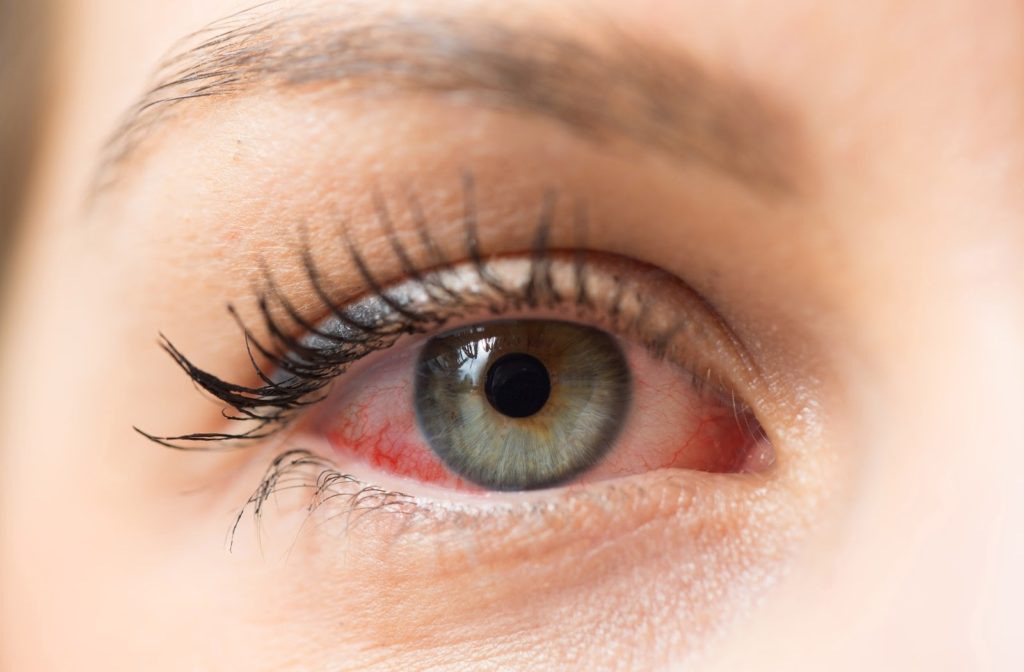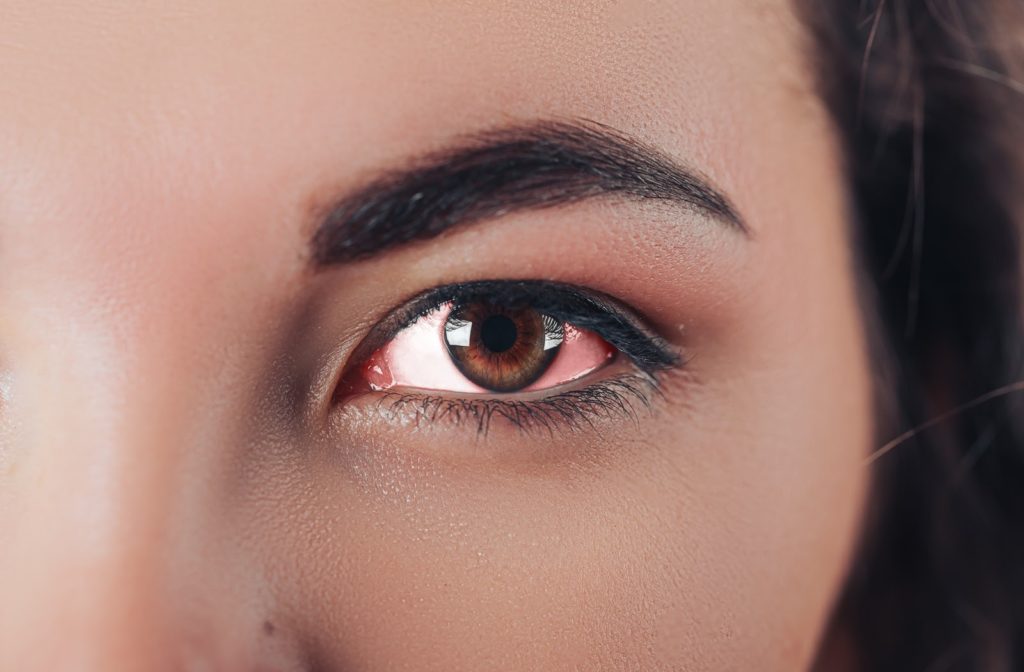Red, irritated, and watery eyes are key symptoms of dry eye disease, and they are indicators of eye allergies as well. A comprehensive eye exam can diagnose what is causing your symptoms.
Before you book an appointment, is there any way to tell the difference between dry eye and allergies? Learn more about dry eye, allergies, and how to tell the difference, below.
What is Dry Eye
Dry eye is a common eye condition affecting nearly 30% of Canadians. Your eyes are moistened by tears each time you blink and they keep the surface of the eye clean and clear of debris. Complications can occur if tear production and drainage are not balanced
You can be affected by dry eye for two main reasons: poor tear quality or an inadequate amount of tears.
Poor tear quality
Your tears are made from three layers of oil, water, and mucin. Oil (or meibum) releases from glands within your eyelids to prevent your tears from evaporating while the mucus layer spreads tears evenly over your eye. When the quality of your tears is impacted by an issue in one of these layers, you can experience dry eye.
Your tears can evaporate too quickly if your meibum becomes impacted due to glands clogging, blocking, or another factor. This is a leading cause of dry eye and is called evaporative dry eye disease.
Inadequate tear production
Glands in and around your eyelids produce tears to help lubricate your eyes. These glands may develop problems and cause you to produce an inadequate amount of tears. This can irritate your eyes when there are not enough tears for proper lubrication.
This can occur for a variety of different reasons, and this type of dry eye is referred to as aqueous deficient dry eye disease.
Dry Eye Symptoms
No matter the reason for your dry eye, the symptoms are similar. There are many different symptoms of dry eye, and some may seem like normal occurrences. Dry eye symptoms can include:
- Light sensitivity
- Red eyes
- Feeling like there is something in your eyes
- Burning, scratchy eyes
- Difficulty wearing contact lenses
- Blurred vision
- Eye fatigue
- Watery eyes
Dry eye disease and general allergies have several overlapping symptoms, and patients often confuse one for the other. Learning more about what causes allergies can help you to understand the difference between these two conditions.
Allergies
Your allergies flare up when you are exposed to a trigger of some sort. Depending on what you are allergic to, you may experience symptoms year-round or during certain seasons. Some common allergy triggers include:
- Pollen
- Pet dander
- Dust mites
- Mould
- Smoke
- Perfume
If you have nasal allergies, you may have an increased risk of eye allergies. Also known as allergic conjunctivitis, eye allergies are not contagious like other forms of conjunctivitis. While itchiness is a major sign of eye allergies, there are several other associated symptoms.
Allergy Symptoms
When you are exposed to a trigger, your eyes may become irritated, red, or painful. Some common symptoms include:
- Itchy eyes
- Red eyes
- Watery eyes
- Eyelid swelling
- Burning eyes
- Light sensitivity
- Under-eye circles
With many similar symptoms, it is understandable that allergies and dry eye can be confused for one another. By understanding symptoms exclusive to only one condition, you may be able to determine the cause of your eye discomfort.

How Do You Tell the Difference?
If you are suffering from watery, irritated eyes, it may be difficult to know whether this is related to dry eye or your allergies. With so many similarities, you likely cannot determine the cause of your symptoms, so speaking with your optometrist is your best option to diagnose your current problem. Before your appointment, gather some information about your symptoms for an easier diagnosis.
Note Your Symptoms
If you are experiencing symptoms of dry eye and allergies, document what sensations you experience, the time they occur, and the environment around you. This can help your optometrist have an idea of what is causing your symptoms, and create a treatment plan to provide your eyes with relief.
Does the Difference Matter?
Yes, the difference between these two conditions matters. Distinguishing between them allows your optometrist to effectively treat your symptoms.
Dry eye is seen as more severe than eye allergies because of its potential to cause damage to your eye, though eye allergies may lead to dry eye disease. Dry eye and allergies may have similar symptoms, but they are treated differently.
Treatment for eye allergies can include avoiding the allergen, using cold compresses, avoiding contact lenses, and administering artificial tears to dilute the allergen. Typically, the effects of allergens will subside with time, and avoiding the source of irritation is your best prevention method.
Dry eye can be treated in several ways. Your optometrist can determine the most effective treatment for long-term relief. Some possible treatments can include:
- Prescriptive eye drops
- Intense pulsed light therapy
- Punctal plugs
- Scleral contact lenses
No matter the treatment your optometrist recommends, they will help you find relief for your symptoms. Contact their office if you are experiencing any symptoms of dry eye or allergies.
Find Long-Term Relief
Whether it is allergies or dry eye disease, your optometrist can help you find long-term relief. They can offer advice on managing your dry eye or avoiding allergy triggers. Book an appointment if you are experiencing any common symptoms.




94 thoughts on “Dry Eye vs. Allergies: How to Tell the Difference”
Comments are closed.